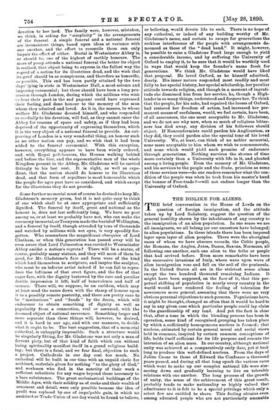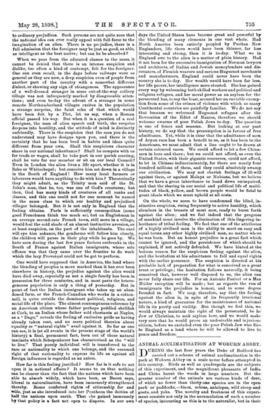THE DISLIKE FOR ALIENS.
THE brief conversation in the House of Lords on the question of foreign immigration, and the attitude taken up by Lord Salisbury, suggest the question of the general hostility shown by the inhabitants of any country to the immigration of an alien population. In one sense we are all immigrants, we all belong (or our ancestors have belonged) to alien populations. In these islands there has been imposed layer upon layer of alien peoples. There were the aboriginal races of whom we have obscure records, the Celtic people, the Romans, the Angles, Jutes, Danes, Saxons, Normans, all following one another, each one alien to the tribe or people that had arrived before. Even more remarkable have been the successive invasions of Italy, where wave upon wave of alien immigration rose and fell on the soil of the peninsula. In the United States all are in the strictest sense aliens except the two hundred thousand remaining Indians. It might have been supposed, on the face of it, that this per- petual shifting of population in nearly every country in the world would have rendered the feeling of toleration for newcomers more general, assuming that there were no very obvious personal objections to such persons. Populations have, it might be thought, changed so often that it would be bard to say in any given case which particular people could lay claim to the guardianship of any land. And yet the fact is clear that, after a time in which the blending process has been in operation, some kind of recognised grouping has taken place by which a sufficiently homogeneous nucleus is formed ; that nucleus, animated by certain general moral and social views held in common, inspired by certain common conceptions of life, holds itself sufficient for its life purpose and resents the intrusion of an alien masa. In our country, although national unity was achieved at a comparatively early date, yet it took long to produce this well-defined nucleus. From the days of Julius thesar to those of Edward the Confessor a thousand years passed, and during all that long epoch the various races which went to make up our complex national life were sim- mering down and gradually learning to live on tolerable relations with one another. The long process of the growth of unity, the sense of the achievement of this great result, probably tends to make nationality so highly valued that admittance to it is felt to be a special privilege which only a select few are entitled to share. This feeling obtains even among educated people who are not particularly amenable to ordinary prejudices. Such persons are not quite sure that the national idea can ever really appeal with full force to the imagination of an alien. There is no prejudice, there is a full admission that the foreigner may be just as good, as able, as intelligent as the beet native; but can he be absorbed ?
When we pass from the educated classes to the mass, it cannot be denied that there is an intense suspicion and dislike, too often a kind of contempt, felt for the foreigner. One can even recall, in the days before railways were as general as they are now, a deep suspicion even of people from another part of the country with a somewhat different dialect, or showing any sign of strangeness. The appearance of a well-dressed stranger in some out-of-the-way colliery village was not infrequently marked by disagreeable atten- tions; and even to-day the advent of a stranger in some remote Northumberland villages excites in the population a strange surprise, the faint echo of that which would have been felt by a Pict, let us say, when a Roman official passed his way. But when it is a question of a real foreigner, the man of alien speech and birth, the surprise deepens into hostility, and the attitude of mind is distinctly unfriendly. There is the suspicion that the man you do not understand may have designs upon you, and there is the certainty that he Las been bred in habits and ideas quite different from your own. Shall this suspicious character share in our national inheritance? Shall he compete with us for trade or wages, shall he take part in our parish meeting, shall he vote for our member or sit on our local Council? Even in London the alien lives a life apart, whether it is in Soho or Whitechapel ; but conceive him set down in a village in the South of England ! How many local farmers or labourers would have anything to do with him ? Theoretically they might admit, as the Trinity man said of the St. John's man, that he, too, was one of God's creatures; but then, God has many kinds of creatures of all ranks and classes, and this one could not for one moment be named in the same class to which our healthy and prejudiced villager belonged. But it is not only in England that the feeling obtains. Paris is sufficiently cosmopolitan (some good Frenchmen think too mach so), but an Englishman in an average second-rate French town, still more in a village, would feel the cold shade of an almost instinctive aversion, or at least suspicion, on the part of the inhabitants. The cure will eye him askance, the gendarme will follow him closely, the children will pause in their play while be goes by. We have seen during the last few years furious outbreaks in the South of France against Italian immigrants, whose sole offence was that they came over the frontier to do work which the lazy Provençal could not be got to perform.
One would have supposed that in America, the land where the blending of peoples is more marked than it has ever been elsewhere in history, the prejudice against the alien would have died away, especially as not a single family has been in possession for three centuries, and in most parts the hetero- geneous population is only a thing of yesterday. But in point of fact the Italian immigrant who takes up an aban- doned farm, or the French-Canadian who works in a cotton- mill, is quite outside the dominant political, religious, and social life of the place. The almost contemptuous reference by an American citizen whose father perhaps peddled shellfish at Cork, to an Italian whose father sold chestnuts at Naples, as a " Dago," reveals the feeling of exclusive pride as having already taken root, and no mere political theories about equality or "natural rights" avail against it. So far as one can see, it is (at all events in the present stage of the world's history) a, final, permanent fact, born out of those natural instincts which Schopenhauer has characterised as the "will to live." That purely individual will is transferred to the race or nationality to which one belongs, and the assumed right of that nationality to express its life as against all foreign influences is regarded as an axiom.
How far is this feeling justified? How far is it safe to act upon it in national affairs ? It seems to us that nothing can be clearer than the fact that the nations which have been able to absorb widely, which have been, as Bacon says, liberal in naturalisation, have been immensely strengthened thereby. Rome conferred rights of citizenship far and wide, just as she introduced into her Pantheon the deities of half the nations upon earth. That bhe gained immensely by that policy is a fact not open to dispute. In our own
days the United States have become great and powerful by the blending of many elements in one vast whole. Had North America been entirely peopled by Puritan New Englanders, life there would have been thinner, far less interesting and strong, than it is to-day. What we in England owe to the alien is a matter of plain history. Had it not been for the successive immigration of Norman lawyers and architects, of Italian and Jewish moneylenders and dis- counters, of Flemish weavers and serious Hagnenot merchants- and manufacturers, England could never have been the country she is to-day. Her wealth would have been far less, her life poorer, her intelligence more stunted. She has gained every way by welcoming both skilled workers and political and religions refugees, and her moral power as an asylum for the persecuted has, to say the least, secured her an enviable exemp- tion from some of the crimes of violence with which so many Continental countries are painfully familiar. We do not say- that because we welcomed Huguenot refugees after the - Revocation of the Edict of Nantes, therefore we should, welcome swarms of poor Polish Jews today. The question is one of times and seasons. But looking at our past history, we do say that the presumption is in favour of free admittance. Yet, while it is clear that the admittance of men of Aryan race has been a benefit to us, as it has been to the Americans, we must admit that a line ought to be drawn at certain coloured races. We could afford to let a few China- men in here and there; but we could not afford, as even the United States, with their gigantic resources, could not afford, to let in Chinese indiscriminately, for there are nearly four hundred millions of them, and they could absolutely swamp our civilisation. We may not cherish feelings of against them, or against Malays or Nubians, but we believe that we have a great inheritance to hand down unimpaired, and that the sharing in our social and political life of multi- tudes of black, yellow, and brown people would be fatal to great ideals which we must uphold at all costs.
On the whole, we seem to have condemned the blind, in- stinctive suspicion, rising frequently to active hostility, which slumbers in the breasts of most men, ready to burst forth against the alien; and we feel indeed that the progress of mankind must involve the elimination of this lingering in- heritance of tribal feeling. We feel that one of the attributes of a highly civilised man is the ability to meet on easy and equal terms any other highly civilised man, no matter where he was born. But an honest prejudice is a great fact which cannot be ignored, and the persistence of which should be explained, if not actively defended. We have hinted at the bottom reason for the suspicious feeling against the alien, and the hesitation at his admittance to full and equal rights with the earlier possessor. The suspicion is directed at his probable lack of preparation for what is conceived as a great trust or privilege ; the hesitation follows naturally, it being conceived that, however well disposed to us, the alien can never fully share our life. For an Antonio Panizzi or a Max Muller exception will be made ; but as regards the run of immigrants the prejudice is honest, and to some degree founded in fact. We may, therefore, say that the feeling against the alien is, in spite of its frequently irrational nature, a kind of guarantee for the maintenance of national life in its parity and virility. But though we feel this, we would always maintain the right of the persecuted, be he Jew or Christian, to seek asylum here, and we would make very sure that he would prove an undesirable and injurious citizen, before we excluded even the poor Polish Jew who flies to England as a land where he will be allowed to live in peace and freedom.



































 Previous page
Previous page